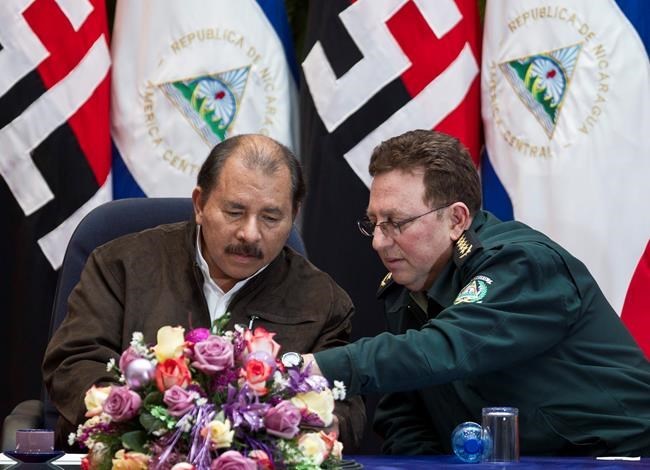
FILE - In this Dec 5, 2012 file photo, Nicaragua's President Daniel Ortega, left, and Nicaragua's Army Commander Gen. Julio Cesar Aviles Castillo speak during the closing ceremony of an annual defense course at the "Casa de los Pueblos" in Managua, Nicaragua. The U.S. Treasury announced sanctions Friday, May 22, 2020 against Aviles Castillo and one other high-ranking Nicaraguan official for their support of government crackdowns on protesters. (AP Photo/Esteban Felix, File)
Republished May 22, 2020 - 11:40 AM
Original Publication Date May 22, 2020 - 11:01 AM
MANAGUA, Nicaragua - The U.S. Treasury announced sanctions Friday against two high-ranking Nicaraguan officials for their support of government crackdowns on protesters.
The Treasury said in a statement that the measures target Gen. Julio César Avilés Castillo, commander of Nicaragua's army, and Finance Minister Iván Acosta. Their designation by Treasury's Office of Foreign Assets Control blocks all the property and interests they might have in the United States.
Avilés Castillo was included for his refusal “to order the disbarment and dismantling of paramilitary or ‘parapolice’ forces during and after the political uprisings that began on April 18, 2018,” the statement said. “The military provided weapons to the parapolice who carried out acts of violence against the Nicaraguan people."
In April 2018, students took to the streets after senior citizens protesting changes to the social security system were met with violence by police and government allies. Protests continued for months and more than 300 people were killed.
Much of the violence was blamed on masked men armed with rifles, but who wore no uniform. Traveling in pickup trucks, they led co-ordinated attacks on street protests and demonstrators' roadblocks and detained government opponents, delivering them to police stations. Due to their weaponry and impunity, they were suspected to have the military's support.
Acosta was included because he has organized financial support for Ortega's government. He was also accused of having “personally threatened banks not to participate in a strike organized by opposition leaders in March 2019.”
Vice-President Rosario Murrillo, Ortega's wife and the government's spokeswoman, responded to a request for comment simply with a quote from Nicaraguan revolutionary Augusto Sandino who fought U.S. intervention: “We won't sell out or surrender, never.” The government has maintained that it was responding to a coup attempt. It has come under more recent criticism for doing nothing to confront the novel coronavirus pandemic.
U.S. Secretary of State Mike Pompeo said in a statement, “This new action furthers United States policy to hold accountable those individuals and entities who are key enablers of Ortega's misrule and who perpetrate serious human rights abuse and seek to silence pro-democracy voices in Nicaragua.”
Juan Sebastián Chamorro, director of the opposition group Civic Alliance, praised the move. He said the alliance had demanded that Avilés disarm the paramilitary groups during talks with the government in 2018 and 2019.
He said sanctioning Acosta was extremely important because “he is the principle financial official in Nicaragua” and represents the country before the World Bank, the Inter-American Development Bank and other regional bodies.
“Today a strong blow was dealt to the regimen of Daniel Ortega,” Félix Maradiaga, leader of the opposition Blue and White National Unity coalition said via Twitter.
Since 2017, the Trump administration has sanctioned 20 some high-ranking government officials, relatives and allies of Ortega, including his wife and two of their children.
Earlier this month, Deputy Assistant Secretary Jon Piechowski, in the U.S. State Department’s Bureau of Western Hemisphere Affairs, said that the U.S. was “open to increasing the pressure” on Ortega's government and applauded sanctions announced by the European Union against six government officials.
News from © The Associated Press, 2020